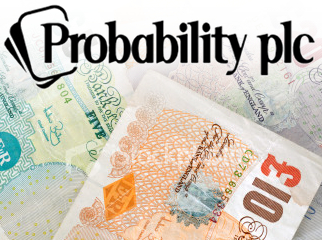 Mobile gambling specialist Probability PLC says it has posted its first quarterly profit in the company’s nine years of operation. The exact amount of this black ink wasn’t revealed in the trading update for the three months ending March 31 (the company’s fiscal Q4), but Probability reported that the feat was accomplished despite a 9.5% decline in net gaming revenues to £1.9m from the same period last year. Probability says it expects full-year revenue will be up 20% to £8.8m, while earnings for the core UK business will be “modest.”
Mobile gambling specialist Probability PLC says it has posted its first quarterly profit in the company’s nine years of operation. The exact amount of this black ink wasn’t revealed in the trading update for the three months ending March 31 (the company’s fiscal Q4), but Probability reported that the feat was accomplished despite a 9.5% decline in net gaming revenues to £1.9m from the same period last year. Probability says it expects full-year revenue will be up 20% to £8.8m, while earnings for the core UK business will be “modest.”
Probability CEO Charles Cohen described the past 12 months as a “transformational year” for the company, evidenced by the shift in emphasis from B2C to B2B operations. Around 60% of total revenue now stems from B2B deals, compared to just 43% in the previous Q4. The acquisition last July of its Italian-facing Playyoo subsidiary generated its first profits this quarter, which also benefited from B2B deals with 888 offshoot Dragonfish and the launch of new games for Paddy Power and Glu Mobile. In fact, Probability has released more slots titles this quarter than the previous three quarters combined.
Probability is now eyeing America for further B2B pacts. Cohen told Reuters the company was in advanced talks with potential US partners looking to mobilize gambling products in states that pass the necessary legislation. While Cohen refused to kiss and tell regarding the companies with which he was negotiating, Cohen said Probability had been “getting a lot of interest” from US gaming firms. Cohen is also eyeing potentially entering “at least one other territory during this year, if not two,” with Sweden, Denmark, France and Spain making Cohen’s shortlist.
Cohen said Probability earns over three-quarters of its revenue from smartphone users. Half of these are using Apple’s iOS platform, but Cohen expects that to fall to 30% within about a year as more users adopt Google’s Android OS. Regardless of what mobile operating system they prefer, Cohen believes users are “voting with their feet” to make desktop computers “dead as a platform for real money gaming.”
